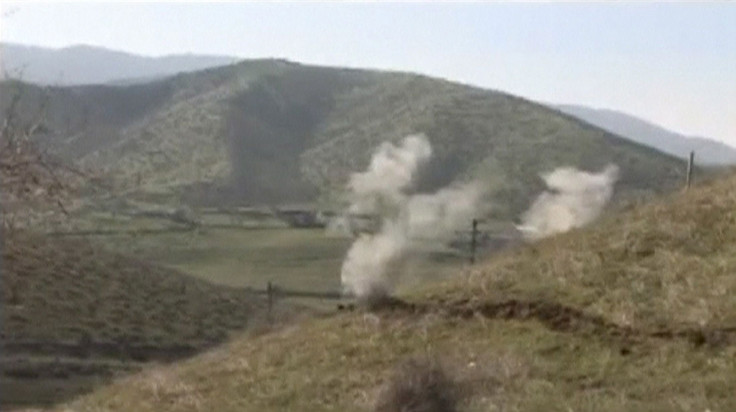Nagorno-Karabakh Clashes: Azerbaijan Announces ‘Unilateral Ceasefire’ After Fighting Kills Over 30

Azerbaijan on Sunday announced a “unilateral ceasefire” in the disputed Nagorno-Karabakh region, where at least 30 soldiers were killed in clashes between Azeri and Armenian forces Saturday. Both sides involved in the bloody clashes, which marked the worst violence in the region since the Russia-backed ceasefire in 1994, blamed the other for inciting the violence.
In a statement released Sunday, Azerbaijan’s defense ministry reportedly said it had decided to “unilaterally suspend operations and response measures,” and added that if its forces came under attack, Azerbaijan “will continue to use all means to destroy the enemy and, without restrictions, liberate the occupied territories and restore territorial integrity.”
However, David Babayan, a spokesman for the defense ministry in Karabakh, told the Agence France-Presse Sunday that clashes were still going on.
"Fierce fighting is under way on southestern and northeastern sectors of the Karabakh frontline," Babayan said.
Earlier, at least 18 Armenian troops and 12 Azeri soldiers were killed in clashes centered at the landlocked mountainous region of Nagorno-Karabakh. Two civilians, including a child, were also reported killed. While Azerbaijan's government blamed the Armenians for breaking the 22-year-old ceasefire, the Armenian side accused Azerbaijan of launching a “massive attack” in the region using tanks and helicopters.
“Azerbaijani authorities are to be held fully accountable for the unprecedented escalation of tensions along the Nagorno-Karabakh and Azerbaijan contact line,” the Armenian defense ministry said in a statement released Saturday.
The Nagorno-Karabakh region, which is surrounded by Azerbaijan on all sides, has been a source of prevailing tension between the two nations since 1988, when the Soviet Union was on its last legs. Since the 1994 ceasefire, the area has been under the control of ethnic Armenian separatists, who seek full independence from Azerbaijan and prefer to call the region by its ancient Armenian name — Artsakh.
“We urge the sides to show restraint, avoid further escalation, and strictly adhere to the ceasefire,” U.S. Secretary of State John Kerry said in a statement condemning the violence Saturday. “We reiterate that there is no military solution to the conflict.”
© Copyright IBTimes 2024. All rights reserved.












